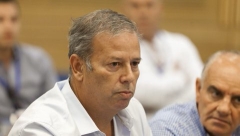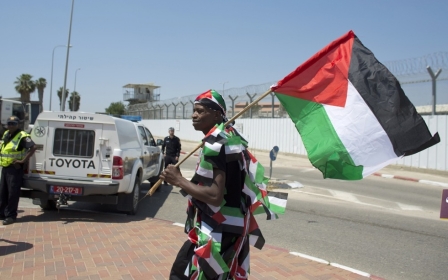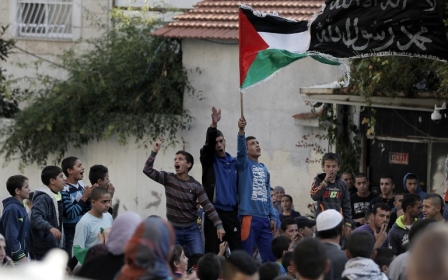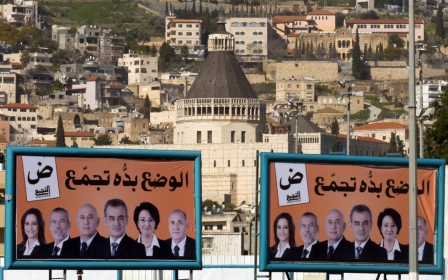Israeli city revives historic mission to keep out Arabs
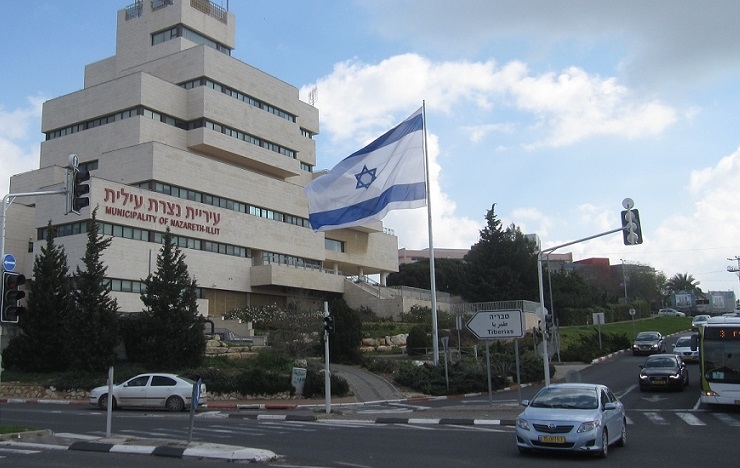
UPPER NAZARETH, Israel - For nearly 60 years, the historic city of Nazareth has been living with an unwelcome neighbour.
Upper Nazareth was built on Nazareth’s confiscated lands on the orders of Israel’s first prime minister, David Ben Gurion. It was part of an official campaign to “Judaise” the only Palestinian city to survive relatively unscathed from the 1948 war.
But if Upper Nazareth and its Jewish residents were supposed to overwhelm the Galilee city that, according to the Bible, was home to Jesus, it has largely failed.
A far greater danger, admit Upper Nazareth’s officials, is that their small city now risks being overrun by the region’s Arab population, especially as residents of Nazareth, many of them Christians, flee major land shortages and a near-bankrupt municipality.
Upper Nazareth’s mayor, Shimon Gapso, recently conceded that the proportion of Arabs in the city – once inhabited almost exclusively by Jews – has risen dramatically over the past 15 years.
One in five residents is now reported to be Arab, members of Israel’s large minority of 1.5 million Palestinian citizens.
According to human rights groups, fears of an Arab takeover stand behind a raft of controversial municipal measures, from banning Christmas trees and blocking the building of a school teaching in Arabic to the latest: refusing to stock books in Arabic at local public libraries.
Unusually, Gapso is tight-lipped at the moment. He was found guilty of bribery in February, but the presiding judge surprised observers by sentencing him to only six months’ community service on 26 April. Although the sentence allows Gapso to return to office, the prosecution is expected to appeal the sentence. Gapso’s suspension is also likely to continue because he is facing another corruption case, due to be heard shortly.
He has refused interviews for the time being, though he told reporters as he left the court in Haifa: “I am a law-abiding citizen. ... I haven’t a shadow of a doubt that I will return to the mayoralty of Upper Nazareth.”
Gapso, however, has told MEE that he stands behind earlier public statements about the need to keep the city Jewish, even as the municipality faces being taken to court over what human rights groups describe as the city’s “racist” policies.
Proud to be ‘racist’
In a now-infamous response to what he called “bleeding-heart” critics published in 2013 in the Haaretz newspaper, Gapso wrote: “I’m not afraid to say it out loud … Upper Nazareth is a Jewish city and it’s important that it remains so. If that makes me a racist, then I’m the proud offshoot of a glorious dynasty of ‘racists’.”
According to Mohammed Zeidan, director of the Human Rights Association in Nazareth, Upper Nazareth’s policies are not simply a reflection of the mayor’s personal initiatives, but part of a wider political culture found in both the city and Israel.
“It is bound up with the concepts of a ‘Jewish city’ and Israel’s Judaisation programme in the Galilee,” Zeidan said. “The racism was inherent in Upper Nazareth’s establishment as a way to neutralise the supposed threat posed by a large Arab population the state regarded as the ‘enemy’.”
Speaking to Middle East Eye, Orna Yosef, Upper Nazareth’s spokeswoman, said the city welcomed all Israeli citizens but maintained that it could never have an Arab majority – or an Arab mayor.
“What Ben Gurion wanted for the city, the municipality wants too,” she said. “It was built for the Jewish people.”
Accusations of racism, while embarrassing city officials, appear to be relished by Gapso. In the last municipal election campaign, in 2013, he littered Upper Nazareth with posters denouncing himself in the words of his sternest critics, including a description of himself as “racist scum”.
It proved a winning formula. Even as corruption allegations swirled around him, Jewish residents re-elected him by a landslide majority.
No Arabic books
Upper Nazareth’s officials can therefore hardly be surprised that they are again in the crosshairs of human rights organisations.
In the latest clash, the Tel Aviv-based Association of Civil Rights in Israel (ACRI) announced that it was launching a legal challenge over the city’s failure to stock a single book in Arabic in any of its three public libraries.
ACRI noted that those libraries have many books in other languages, including English, Russian, Spanish and French, even though – unlike Arabic – none are classed as an official language in Israel.
Auni Banna, a lawyer with ACRI, told MEE that the organisation has sent a stream of letters over the past three years demanding that Upper Nazareth address the failure to provide library and cultural services to its Palestinian population.
Yosef said the municipality would consider building a separate library for the Arab population next year, but added that it would need “time and money”.
Banna said: “We have yet to receive an answer from Upper Nazareth but what they have discussed previously is creating a small separate library – maybe just a few shelves – hidden away in an Arab neighbourhood.
“That sends an implicit message that Arabs are not welcome in other areas, and especially not in the city’s main public spaces, such as the central library. That is not satisfactory.”
Banna added that city officials also need to create a central database of books in Arabic and provide enrichment services, such as story time, lectures and homework assistance, as it does for the Jewish public.
Hani Salloum, a resident who joined ACRI’s petition, said: “As residents and citizens who pay taxes, it is our right – both for adults and children – to receive budgets and resources that allow us to access books in our mother tongue.”
Christmas trees banned
Tensions over the influx of Palestinian citizens have been growing since 2005, when the Israeli government quietly designated Upper Nazareth for the first time as a “mixed city”.
In most of Israel, residency is strictly segregated on the basis of ethnic belonging. Admissions committees block non-Jews from living in hundreds of rural communities that have jurisdiction over most of Israel’s territory.
However, with successive governments refusing to approve a single new Arab community since Israel’s founding, the Galilee’s Judaisation cities have come under growing pressure from Palestinian citizens living in surrounding towns and villages that have become massively overcrowded.
Elected in 2009, Gapso ran on an overtly anti-Arab platform – later dropped on legal advice – of setting up a municipal fund designed to help Jews buy homes in the city.
He has refused to allow a mosque or church to be built, or to allot a section of the municipal cemetery for non-Jews. In 2010, he banned Christmas trees in public buildings.
His officials were also found in contempt by the supreme court in 2011 for failing to implement a 2002 ruling that road signs include Arabic as well as Hebrew.
After protests in Nazareth against Israel’s attack on Gaza in late 2012, Gapso made headlines calling the neighbouring city “a nest of terror” and demanding the government declare it “a city hostile to the state of Israel.”
But most controversially, he has refused to approve an Arabic-language school for the city’s 2,000 Palestinian children. Instead, given Israel’s segregated education system, pupils have been forced to scramble for places in heavily oversubscribed schools in neighbouring Nazareth.
Letters from ACRI demanding that the mayor honour his legal commitment to the city’s Arab children were characterised by Gapso as “a provocative nationalist statement.” The education ministry has so far declined to intervene.
Giant Israeli flags
In 2013, as Gapso came under mounting pressure on the schools issue, he sent out a pamphlet to residents warning: “This is the time to guard our home!… All requests for foreign characteristics in the city are refused.”
He explained that he had erected giant Israeli flags, bearing the Star of David, at every intersection between Nazareth and Upper Nazareth “so that people will know that [Upper Nazareth] is a Jewish city”.
Gapso’s very public struggle against an “Arab takeover” has resonated more widely in Israel, where there are long-standing fears among Israeli Jews about the faster growth rate of the Palestinian population.
Other Judaisation cities, faced with growing migration from Palestinian citizens living in surrounding communities, have tried to adopt similar policies.
Officials in Karmiel, in the central Galilee, set up a hotline in 2010 for Jewish residents to inform on neighbours planning to sell homes to Arabs. There have also been reports of vigilante-style patrols deterring Palestinian residents of neighbouring villages from entering the city.
Nationalist politicians regularly refer to the country’s Palestinian citizens, a fifth of the population, as a “demographic timebomb”.
The minority, which is increasingly highlighting its historic and emotional links to Palestinians in the occupied territories, has also been characterised as a “cancer” and “fifth column”.
Darling of the right
Gapso rapidly became the darling of rightwing parties in Benjamin Netanyahu’s two previous governments for his outspoken stance. He found an especially close ally in Uri Ariel, a settler and the housing minister until elections last month.
Together, they devised a plan to quickly restore the city’s Judaisation role. A new neighbourhood of 3,000 homes is being built that will be available only for Jews. It is being marketed exclusively to the ultra-Orthodox population.
The decision to bring fundamentalist religious Jews into a city that is currently dominated by secular immigrants from the former Soviet Union appears to have been guided chiefly by demographic considerations.
Typically, the ultra-Orthodox have large families of up to 10 children. With 3,000 new homes planned for the neighbourhood, this could mean 30,000 new Jews boosting the Jewish majority in a city that currently numbers only 50,000 residents.
Spokeswoman Orna Yosef said the neighbourhood would ensure “Arabs cannot be the majority”.
Raed Ghattas, an Arab councillor in Upper Nazareth, said such policies were part of a “continuum of racism” in the city.
Local Arab residents feared that the municipality’s intention in bringing in religious Jews in such large numbers was to trigger ethnic and religious tensions, he added.
Across Israel, there have been reports of ultra-Orthodox communities clashing with secular populations, stoning cars that drive on the Sabbath and attacking women for being immodestly dressed.
“Looked at objectively, this obsession with demography, planning and classifying everything in terms of ‘Arab’ and ‘Jewish’ is seriously abnormal behaviour,” said Mohammed Zeidan, director of the Human Rights Association of Nazareth.
“But it makes sense in a state whose goal is to dominate everything that is not Jewish. Then the smallest features of life, even the books in a library, become part of your national struggle.”
New MEE newsletter: Jerusalem Dispatch
Sign up to get the latest insights and analysis on Israel-Palestine, alongside Turkey Unpacked and other MEE newsletters
Middle East Eye delivers independent and unrivalled coverage and analysis of the Middle East, North Africa and beyond. To learn more about republishing this content and the associated fees, please fill out this form. More about MEE can be found here.


